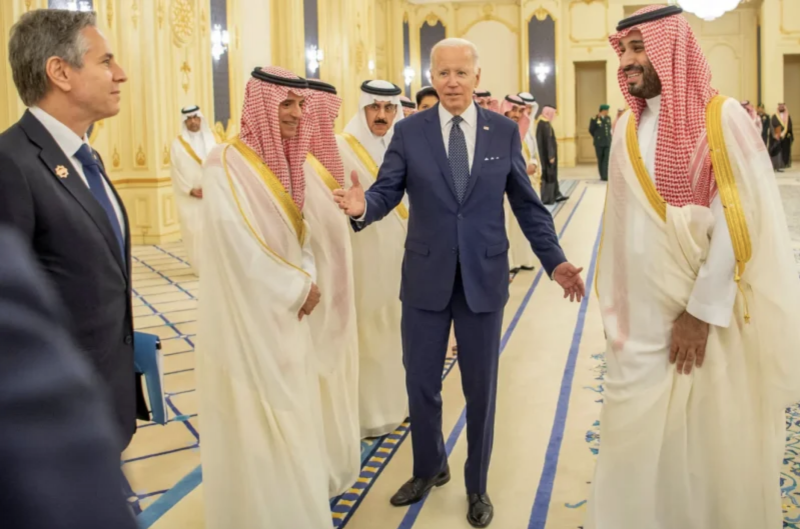
Saudi Crown Prince Mohammad bin Salman receiving US President Joe Biden in Saudi Arabia, July 2022. (Credit: Bander al-Jaloud/Getty Images/Archives AFP)
Could the sequence that began on Oct. 7 end with a deal that would once again reshape the region?
That’s what the Biden administration continues to believe, holding on against all odds to the idea that this chapter could end with an Israeli-Saudi normalization agreement and revive the peace process, leading to the creation of a Palestinian state.
Several Western and Arab diplomats confirmed to L’Orient-Le Jour that Washington was still optimistic about this dossier. The US envoys visiting Riyadh for months have repeated this.
But the task is complicated. The normalization agreement comprises two main parts. The first is about US-Saudi relations. Riyadh wants to be given security guarantees and a chance to develop its civilian nuclear program, while Washington wants Saudi Arabia to distance itself from Beijing in return. Here, there has been positive and rapid progress.
During his latest visit to Riyadh last week, US National Security Advisor Jake Sullivan discussed an almost final version of the agreement with Crown Prince Mohammed bin Salman (MBS).
The second part, however, is less underway. Normalization with Israel implies, at the very least, an Israeli commitment to the creation of a Palestinian state. Israeli Prime Minister Benjamin Netanyahu has repeatedly stated that he is against that.
Saudi Arabia is calling for an immediate cease-fire in Gaza, Israeli withdrawal from the Palestinian enclave and the rehabilitation of the Palestinian Authority (PA), the only credible interlocutor in the kingdom’s eyes. Despite US pressure, however, Israeli leaders continue to say that the Rafah offensive will only end once Hamas has been dismantled.
“If Saudi Arabia reaches an agreement with the US, it will not shut the door to normalization with Israel, provided that there is a clear commitment to the future creation of a Palestinian state,” said an Arab diplomat. In other words, the kingdom wants to safeguard appearances and is throwing the ball into the US court.
Will US pressure be enough for Netanyahu to yield? For the moment, it is uncertain, although he is under threat of an arrest warrant from the International Criminal Court (ICC). Washington may be tempted to support his main opponent, Benny Gantz, and encourage him to resign. On Saturday, the latter gave the prime minister until June 8, i.e. three weeks, to agree on a strategic post-war “action plan,” or else he would quit.
Such resignation will not be enough to bring down the government, and even if it implodes, three months will be needed to organize new elections. There is no guarantee that the future prime minister will commit to the creation of a Palestinian state.
Disaster scenario
The US still has much to do if it wants to secure this historic agreement. At the same time, it is continuing negotiations with Iran in Oman to ease tensions in the region and prevent war from spreading.
L’Orient-Le Jour learned that a new phase in the talks will take place in the next few days. Washington insists that the war must not spread to Lebanon. This would be a disaster scenario for the Biden administration, in the run-up to the US elections.
As a result, the Biden-Netanyahu tug-of-war is likely to harden even further in the coming weeks.
Meanwhile, two developments may also affect regional dynamics. The first is linked to the death of Iranian President Ebrahim Raisi and his Foreign Minister, Hossein Amirabdollahian, in a helicopter crash. Raisi’s death is likely to intensify Iran’s internal struggles, particularly over the succession of supreme leader. These internal battles could complicate negotiations with the US or weaken Iran’s position.
The second concerns King Salman’s health conditions. MBS has postponed his visit to Japan because he is required to stay in Saudi Arabia given the circumstances. The king’s death could, however, facilitate a possible Israeli-Saudi normalization agreement, as the current sovereign is far more concerned than his son with the Palestinian issue.
This article was originally published in L'Orient-Le Jour. Translated by Joelle El Khoury.